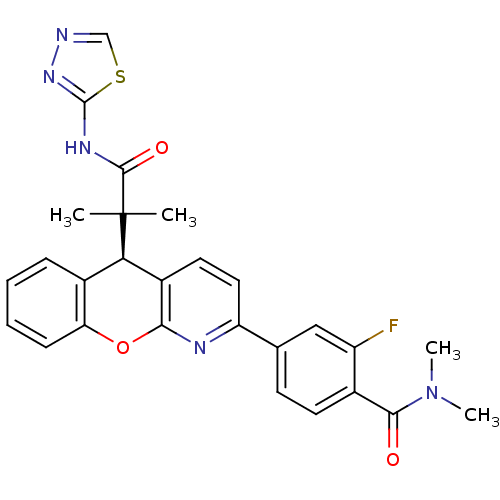BDBM50355740 CHEMBL1911272
SMILES CN(C)C(=O)c1ccc(cc1F)-c1ccc2[C@@H](c3ccccc3Oc2n1)C(C)(C)C(=O)Nc1nncs1
InChI Key InChIKey=NFBRIOXZUUCQFQ-JOCHJYFZSA-N
Activity Spreadsheet -- Enzyme Inhibition Constant Data from BindingDB
 Found 10 hits for monomerid = 50355740
Found 10 hits for monomerid = 50355740
Affinity DataKi: 1.94nMAssay Description:Displacement of GS-red from glucocorticoid receptor by fluorescence polarization assayMore data for this Ligand-Target Pair
Affinity DataKi: 1.53E+3nMAssay Description:Displacement of fluorescently labeled ligand from progesterone receptor by fluorescence polarization assayMore data for this Ligand-Target Pair
Affinity DataKi: >5.00E+3nMAssay Description:Displacement of fluorescently labeled ligand from androgen receptor by fluorescence polarization assayMore data for this Ligand-Target Pair
Affinity DataKi: >7.50E+4nMAssay Description:Displacement of fluorescently labeled ligand from ERalpha receptor by fluorescence polarization assayMore data for this Ligand-Target Pair
Affinity DataEC50: 33.2nMAssay Description:Transrepression activity at glucocorticoid receptor alpha in phorbol myristate acetate-stimulated human A549 cells assessed as inhibition of AP1 resp...More data for this Ligand-Target Pair
Affinity DataEC50: 33.8nMAssay Description:Transrepression activity at glucocorticoid receptor alpha in IL-1beta-stimulated human A549 cells assessed as inhibition of NFkappaB-dependent E-sele...More data for this Ligand-Target Pair
Affinity DataEC50: 242nMAssay Description:Transactivation activity at GR-alpha in human NP1 Hela cells assessed as induction of GAL4-DBD after 20 hrs by luciferase reporter gene assayMore data for this Ligand-Target Pair
Affinity DataEC50: 150nMAssay Description:Transactivation activity at glucocorticoid receptor alpha human 13D3/Huh7 cells assessed as induction of TAT activity after 4 hrs by spectrophotometr...More data for this Ligand-Target Pair
Affinity DataEC50: 143nMAssay Description:Transactivation activity at GR-alpha in human NP1 Hela cells assessed as inhibition of GAL4-DBD after 20 hrs by luciferase reporter gene assayMore data for this Ligand-Target Pair
Affinity DataEC50: >5.00E+3nMAssay Description:Agonist activity at human mineralocorticoid receptor expressed in human A549 cells by fluorescence polarization assayMore data for this Ligand-Target Pair
